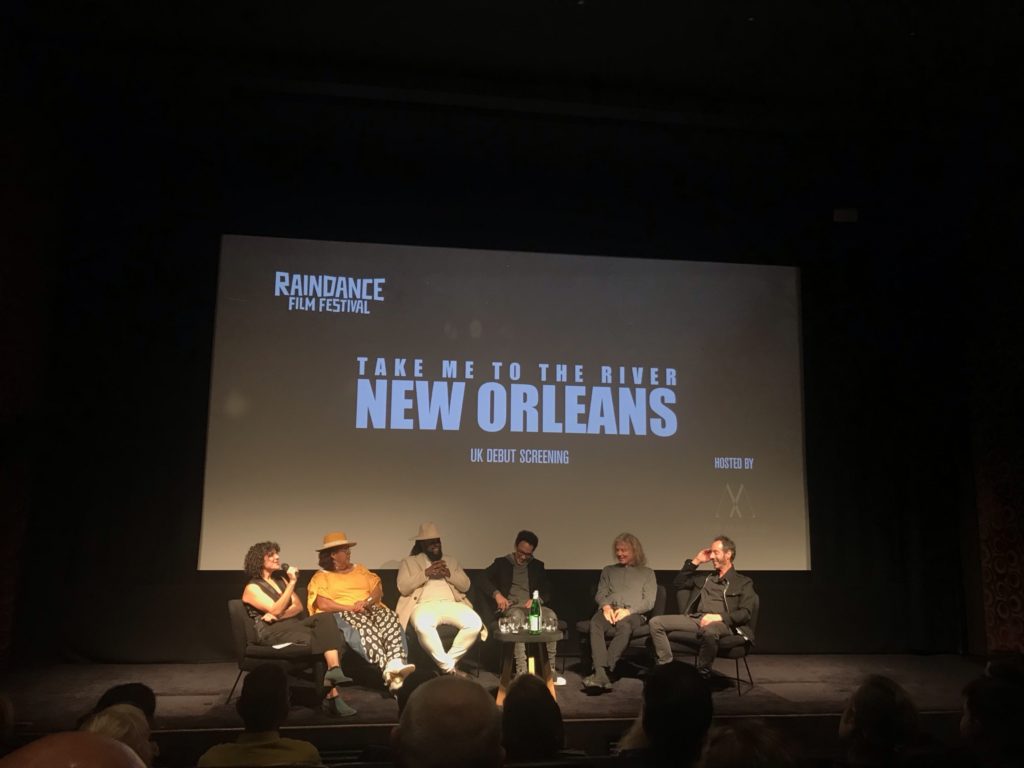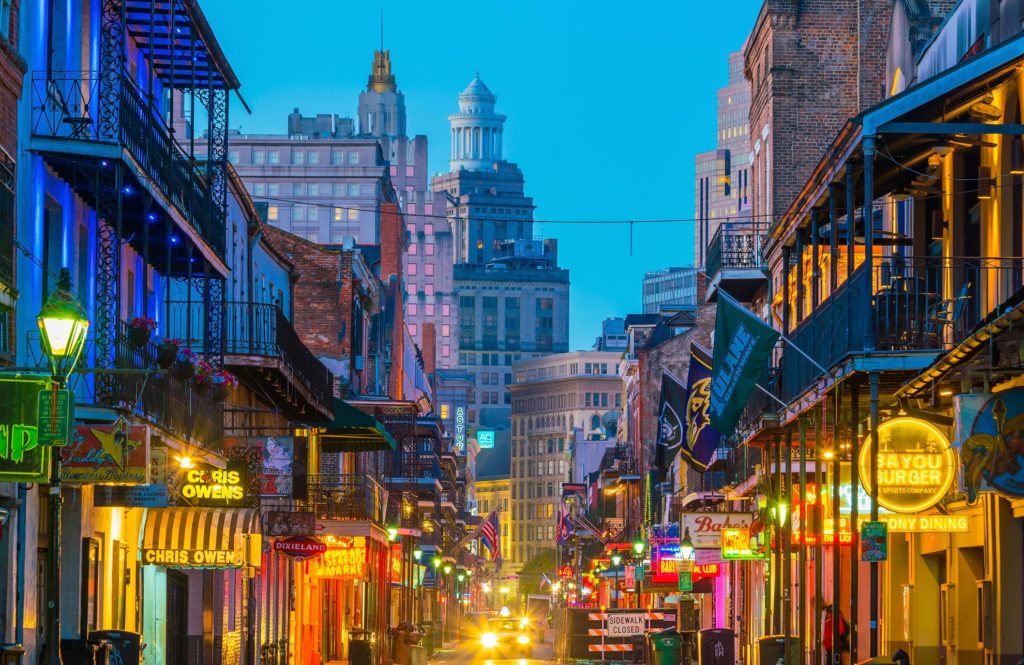Take Me To The River: New Orleans leaves you with the notion that New Orleans isn’t just a place, but an identity that doesn’t leave you
Lauren Hurrell says, ‘Take Me To The River: New Orleans leaves you with the notion that New Orleans isn’t just a place, but an identity that doesn’t leave you, and so where those people went, they have taken music with them, to share the spirit of New Orleans around the world beyond the city itself’.
Contribution by Lauren Hurrell.
In November 2021, the exclusive debut UK screening of Take Me To The River – New Orleans took place at the May Fair Hotel in London as part of the Raindance Film Festival. A Q&A followed the screening with the film director Martin Shore, Jerry Harrison from Talking Heads, Ian Neville from Dumpstaphunk, Big Chief Bo Dollis jr and Big Queen Rita from The Wild Magnolias, the Mardi Gras Indian tribe who also perform as a funk act from New Orleans. The Q&A was chaired by DJ Lil’ Koko from Jazz FM, host of ‘The Big Easy’.
Take Me To The River: New Orleans is the sequel to Martin Shore’s first documentary film of the same name. The prior, Take Me To The River (2014), is a feature documentary that celebrates the musical influence of Memphis despite pervasive discrimination and segregation experienced by key influencers of Memphis’ music scene. It follows Memphis and Mississippi Delta’s inspiring and profoundly influential artists, documenting their creative process of recording a new album as an attempt to re-imagine the utopia of Memphis’ inter-generational, interracial and intergender collaborative fabric in its heyday.
This second documentary in the series by Martin Shore, a Grammy-nominated musician and famed feature-film producer, continues to document the soul of American music. This time, it focuses on the rich fabric that makes up New Orleans’ music scene, a place that has shown resilience like no other. It celebrates the musical history, influence and legacy of New Orleans and Louisiana, chronicling its resilient culture and the collaborative melting pot of its influencers who have come from around the world to create an epicentre of soul music creation, where music, quite literally, oozes out from the streets.
Take Me To The River: New Orleans explores the influences of New Orleans’ vibrant music scene. The film highlights 20-25 new songs created by New Orleans’ musicians from all different ages as they collaborate inside music studios, talking about their experiences and influences that come from the streets and culture of New Orleans. We see legacy musicians from the scene play and sing alongside today’s stars. The film shows appearances from The Neville Brothers, The Meters, Jon Batiste, Mystikal, Ani Difranco, Davell Crawford, Dr John, Galactic, Anders Osborne, Big Chief Monk Boudreaux, Dumpstaphunk, Snoop Dogg, LG, Lost Bayou Ramblers, G-Eazy, Rebirth Brass Band, Donald Harrison, Christian Scott, Walter Wolfman Washington, Mannie Fresh, Pretty Lights, and many more.

With some of the final performances of the Neville Brothers and Dr John captured in the documentary, it invites us in behind the closed studio doors where so much magic has happened in creating the city’s broad music landscape of soul, hip hop, funk, jazz and brass. Not only that, but the soul of these people also shines through in their creative and joyful interactions with each other and their pure, unadulterated love for the music.
Throughout the documentary, we learn that many of the influential performers we have been watching have passed away since these scenes in the studio were documented. There is a message of a memorial, generational hope and the importance of getting the younger generations involved in the scene, too, with the documentary itself becoming a vital source of preserving the New Orleans legacy, for it to be passed onto others as a form of musical education and inspiration.
In the Q&A, much of the conversation discussed hope and the resilient power of music, particularly in light of the global pandemic. Big Chief Bo Dollis jr and Big Queen Rita from The Wild Magnolias touched on the difficulty of Mardi Gras parades being cancelled and the inability of their community to come together in the coronavirus lockdowns. The documentary highlights the power and impact of these parades on those who participate, celebrating the intricate details and dedication from the unique, handmade outfits with technique and styles handed down through generations, and the dedication and organisation all the way to the performances that preserve these communities’ traditions.

The film resurrects hope in showing how culture can be resilient in the face of strife and disaster.
New Orleans is no stranger to the latter. It explores how New Orleans lost much of its musical fabric in the floods caused by Hurricane Katrina in August 2005, which caused over 1,800 deaths and USD 125bn in damage. The storm surge damaged the levees and floodwalls that were protecting the city of New Orleans. Experts considered this to be the worst engineering disaster in the history of the United States. 80% of New Orleans became flooded, with some parts under 15 feet of water. The famous heart of the city, the French Quarter; known for its French and Spanish Creole architecture and vibrant nightlife along Bourbon Street and Garden District, being above sea level, we’re able to escape flooding.
This disaster caused many residents of New Orleans to leave the flooded city, without their possessions to start again. It displaced over 50% of its population. Many of the hailed or future musicians who would make up and carry on the music were among them. While New Orleans’ legacy as a cultural crown jewel still stands, Hurricane Katrina caused huge gaps in the generational makeup of the city.
This could be said in mourning, but the film leaves you with the notion that New Orleans isn’t just a place, but an identity that doesn’t leave you, and so where those people went, they have taken music with them, to share the spirit of New Orleans around the world beyond the city itself. New Orleans continues to be celebrated worldwide for its distinctive music, Creole cuisine, festivals and cultural heritage. It has frequently been described as a unique city in the United States for its cross-cultural heritage and its prominent role in pop culture, upholding its reputation for resilience and the power of music to connect people and preserve the legacy of those who made it.
Contribution by Lauren Hurrell.
Check out the GUAP Arts & Culture section, to discover new art, film, and creative individuals.




![ZINO VINCI’S ‘FILTHY & DISGUSTING’EP BRINGS YOU TO THE CORE OF THE ARTIST [@ZinoVinci]](https://guap.co/wp-content/uploads/2023/10/Zino-4.jpg)





![Remel London’s [@Remel_London] “Mainstream” is a must attend for upcoming presenters!](https://guap.co/wp-content/uploads/2017/02/REMEL-LONDON-FLYER-FINAL-YELLOW-COMPLETE-1.png)